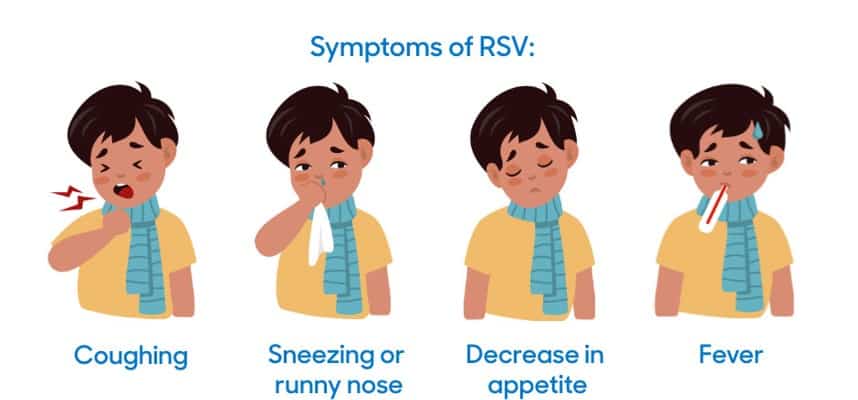Respiratory syncytial virus (RSV) causes infections of the lungs and respiratory tract. It is common that most children have been infected with the virus by age two. Respiratory syncytial virus can also infect adults. Self-care measures are usually all that is needed to relieve any discomfort. RSV can cause severe infection in some people, including 12 months old baby and younger (infants), especially premature infants, adults, people with heart and lung disease, or anyone with a weak immune system.
Symptoms
Signs and symptoms of respiratory syncytial virus infection most commonly appear about 4 to 6 days after exposure to the virus. In adults and older children, RSV usually causes mild cold-like signs and symptoms. These may include:
- Sore throat
- Headache
- Dry cough
- Low-grade fever
- runny nose
- Sneezing
RSV infection can spread to the lower respiratory tract, causing pneumonia or bronchiolitis — inflammation of the small airway passages entering the lungs. Signs and symptoms may include:
- Fever
- Severe cough
- Wheezing — a high-pitched noise that’s usually heard on breathing out
- Rapid breathing or difficulty breathing
- Bluish skin due to lack of oxygen
Infants are most severely affected by RSV. Signs and symptoms of severe RSV infection in infants include:
- Short, shallow and rapid breathing
- Struggling to breathe
- Cough
- Poor feeding
- Unusual tiredness
- Irritability
Most children and adults recover in one to two weeks, although some might have repeated wheezing. Severe or life-threatening infection requiring a hospital stay may occur in premature infants or in anyone who has chronic heart or lung problems.
Causes
Respiratory syncytial virus enters the body through the eyes, nose or mouth. It spreads easily through the air on infected respiratory droplets. You or your child can become infected if someone with RSV coughs or sneezes near you. The virus also passes to others through direct contact, such as shaking hands.
The virus can live for hours on hard objects such as countertops, crib rails and toys. Touch your mouth, nose or eyes after touching a contaminated object and you’re likely to pick up the virus.
An infected person is most contagious during the first week or so after infection. But in infants and those with weakened immunity, the virus may continue to spread even after symptoms go away, for up to four weeks.
Risk factors
By age two, most children will have been infected with respiratory syncytial virus, but they can get infected by RSV more than once. Children who attend child care centres or who have siblings who attend school are at a higher risk of exposure and reinfection. RSV season — when outbreaks tend to occur — is the fall to the end of spring.
Complications
Complications of respiratory syncytial virus include:
- Hospitalization. A severe RSV infection may require a hospital stay so that doctors can monitor and treat breathing problems and give intravenous (IV) fluids.
- Pneumonia. RSV is the most common cause of inflammation of the lungs (pneumonia) or the lungs’ airways (bronchiolitis) in infants. These complications can occur when the virus spreads to the lower respiratory tract. Lung inflammation can be quite serious in infants, young children, older adults, immunocompromised individuals, or people with chronic heart or lung disease.
- Middle ear infection. If germs enter the space behind the eardrum, you can get a middle ear infection (otitis media). This happens most frequently in babies and young children.
- Asthma. There may be a link between severe RSV in children and the chance of developing asthma later in life.
- Repeated infections. Once you’ve had RSV, you could get infected again. It’s even possible for it to happen during the same RSV season. However, symptoms usually aren’t as severe — typically it’s in the form of a common cold. But they can be serious in older adults or in people with chronic heart or lung disease.
Prevention is better
Since, no vaccine exists for respiratory syncytial virus, these lifestyle habits can help prevent the spread of this infection:
- Wash your hands frequently. Teach your children the importance of hand-washing.
- Avoid exposure. Cover your mouth and nose when you cough or sneeze. Limit your baby’s contact with people who have fevers or colds.
- Keep things clean. Make sure kitchen and bathroom countertops, doorknobs, and handles are clean. Discard used tissues right away.
- Don’t share drinking glasses with others. Use your own glass or disposable cups when you or someone else is sick. Label each person’s cup.
- Don’t smoke. Babies who are exposed to tobacco smoke have a higher risk of getting RSV and potentially more-severe symptoms. If you do smoke, never do so inside the house or car.
- Wash toys regularly. Do this especially when your child or a playmate is sick.
